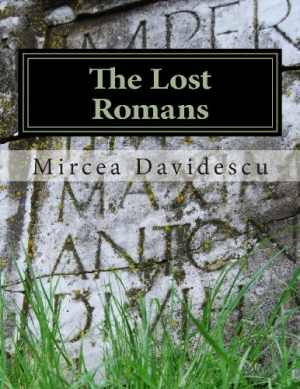The Lost Romans
History and Controversy on the Origin of the Romanians
Davidescu’s writing is rife with wordplay and playful references that turn a potentially dry text into a fun read.
The Lost Romans uses archaeological, linguistic, and historical sources to explore the origins of the Romanian people with a thorough, academic style that will please historians and interest hobbyists.
Like much of Europe’s history, the Romanian past is a jumbled confusion of linguistic red herrings and the forgotten graves of wave upon wave of invaders. Beginning at the dawn of human civilization, Mircea Rasvan Davidescu describes Romania’s role in world events by relating it first to Greek civilization, then to occupation by Rome, by various invading armies, and eventually by a culture of quasi-nomadic shepherds claiming Roman ancestry (hence “Romanians”).
As a historical work, The Lost Romans is both interesting and educational, a very appreciable alternative take on European history. This is particularly true of the Roman era, upon which the author focuses intently; experiencing Rome’s political and military style from the point of view of a small but successful province is extremely interesting.
The linguistic and archaeological evidence for the Roman origin of Romanian culture and ethnicity is laid out plainly and with verve, clearly the result of the author’s untiring research and true passion for his subject. While Davidescu often disagrees with established sources, his independent conclusions are both logical and historically plausible.
Dabbling also in politics, this book highlights a longstanding territorial dispute between Romanians and Hungarians. Davidescu comes down solidly on the side of the Romanians, but never makes assertions without academic support. The result is that rarest of political pieces: an opinion founded on research. Regardless of their interest in this specific political corner, many experienced political writers could well take a page from this young man’s book.
Davidescu’s writing is very lively and engaging, rife with wordplay and playful references. While this turns a potentially dry text into a fun read, current memes like “Mission Accomplished” (referring to President George W. Bush’s infamous aircraft carrier photo) will eventually become dated signs of the times.
History buffs, particularly those already somewhat familiar with Europe, will enjoy The Lost Romans. Newcomers to the field will also be able to follow along, though they may find themselves consulting the encyclopedia for the names of obscure places and historical figures. Though the book’s focus on Romanians and frequent references to the Romanian-Hungarian territory feud may narrow its audience, it is a fine example of its genre and a good way to spend an afternoon.
Reviewed by
Anna Call
Disclosure: This article is not an endorsement, but a review. The publisher of this book provided free copies of the book and paid a small fee to have their book reviewed by a professional reviewer. Foreword Reviews and Clarion Reviews make no guarantee that the publisher will receive a positive review. Foreword Magazine, Inc. is disclosing this in accordance with the Federal Trade Commission’s 16 CFR, Part 255.

